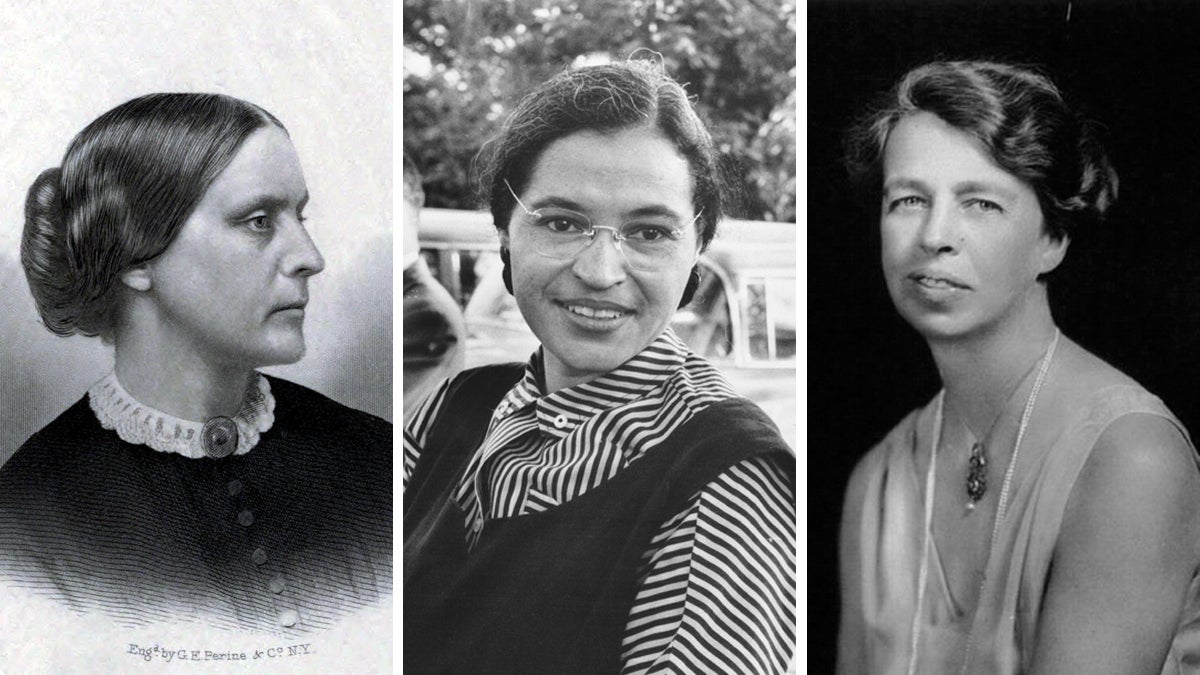‘A woman’s place is on the money’

Susan B. Anthony, Rosa Parks and Eleanor Roosevelt have been suggested as possibilities to appear on the $20 bill.
I generally avoid watching CNN, lest I be informed via unconfirmed rumor that a missing Malaysian plane has collided with Harrison Ford. But on Friday, my attention was snagged by a talking head who says it’s time to put a woman on our paper currency.
And I thought, “Heck yeah. Why hasn’t that happened already?”
On everyday currency, all we’ve got are dead presidents, plus Ben Franklin and Alexander Hamilton. Surely, by now, we should be honoring a prominent member of the majority gender. As Susan Ades Stone, executive director of Women on 20s, said on CNN, “We have so few women that we really see in our everyday lives who are iconic and historic heroes, and we think that should be changed.”
The plan — maybe just a grassroots pipe dream, but you never know — is to petition the White House and the Treasury Department to dump Andrew Jackson from the $20 bill and install a female by the year 2020, to coincide with the 100th anniversary of women’s right to vote. Stone’s website lists 30 female nominees, and invites its visitors to vote; late last week, more than 100,000 people had already done so, and the plan threatens to go viral. (The site’s credo — “A woman’s place is on the money” — has the requisite snap.)
Granted, none of the women on the list were instrumental in founding the nation (like Franklin and Jefferson). None were instrumental in saving the nation (Lincoln). None of them slaughtered Native Americans and drove them from their lands (Jackson). None of them commanded troops (like Washington and Grant). But that’s mostly because they hewed to the prevailing cultural mores and dutifully kept the home fires burning.
And besides, there are lots of ways to make a contribution to the life of a nation. This concept is a no-brainer elsewhere in the western world. For two decades during the 20th century, the British had Florence Nightingale on their 50-pound note. They currently have Elizabeth Frey, a Quaker social reformer, on their five-pound note. They’re currently preparing to put Jane Austen on their one-pound note.
Down in Australia, where the currency is called the dollar, soprano singer Nellie Melbie is on the $100 note. Edith Cowan, the first woman parliamentarian, is on the $50 note. Mary Reibey, an 18th-century shipping magnate and philanthropist, is on the $20 note. Mary Gilmore, a poet, is on the $10 note. And before France switched to the euro, Marie Curie appeared on the 500-franc note.
I know we’re supposedly Number One in everything, but apparently the question of putting a woman on the money has long been asked and answered. The problem, on these shores, is that the faces on the bills haven’t been changed since 1929; that alone is an argument for diversity. President Obama even signaled his interest in a speech last July: “A young girl wrote to ask me why aren’t there any women on our currency. And then she gave me a long list of possible women…which I thought was a pretty good idea.”
Of course, the fact that Obama deems it “a pretty good idea” probably means that Republicans would call it a “train wreck,” but the beautiful thing is that Treasury can act on its own. As Stone said, “The money is in the Treasury budget to do the design. As long as we stay within the requirements, which is you have to be dead for two years and you have to be someone of great stature, and you’re supposed to be recognized by the public…”
But who meets the criteria of “great stature?”
No way this country puts a soprano, a poet, or a novelist on the currency. Stone’s group, working with historians, winnowed the list to 15 possibilities. I doubt that Margaret Sanger would be a sufficiently nonpartisan choice, because she opened the first birth control clinic (the right-wing Breitbart “News” site has already attacked that scenario). I suspect that environmentalist Rachel Carson would spark the ire of people who hate the EPA. I suppose you could make a case against anyone (you could also make a case against $50 denizen Ulysses S. Grant), but personally, I’d go with Eleanor Roosevelt, who rose from mousy spouse to human rights leader and U.N. ambassador.
So what do you say, Jack Lew? Isn’t it time to do what our western allies have been doing for years? When Treasury Secretary Lew was asked about this recently, he replied: “We’ve been looking at a whole range of issues on how to modernize our currency….We’re looking at a lot of interesting things.”
The standard D.C. dodge. I bet Eleanor would’ve had a good rejoinder.
——-
Sometimes, in the course of human events, there is a political development so delicious, so giddily delightful, that the heart beats faster in joyful anticipation. Looking ahead, there will never be sufficient popcorn to sate our hunger for this entertainment.
——-
Follow me on Twitter, @dickpolman1, and on Facebook.
WHYY is your source for fact-based, in-depth journalism and information. As a nonprofit organization, we rely on financial support from readers like you. Please give today.

